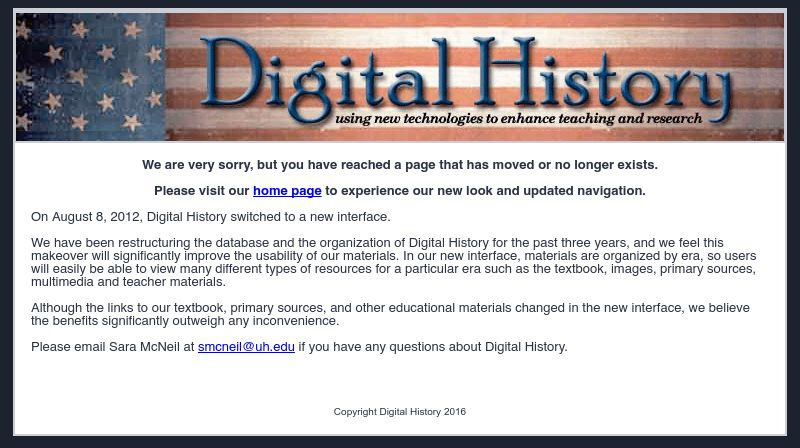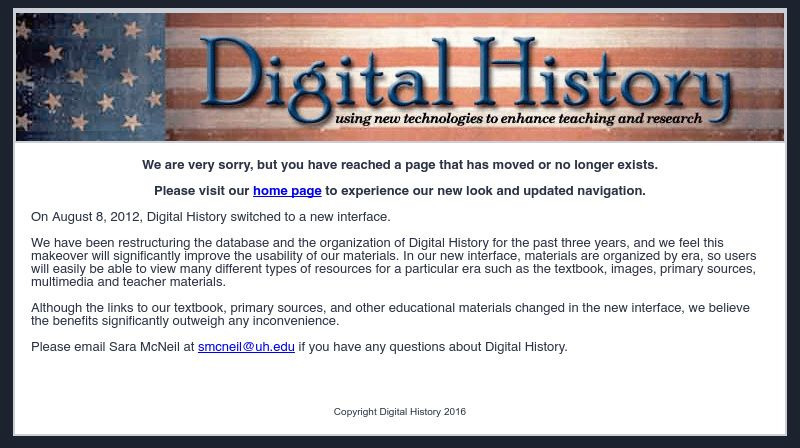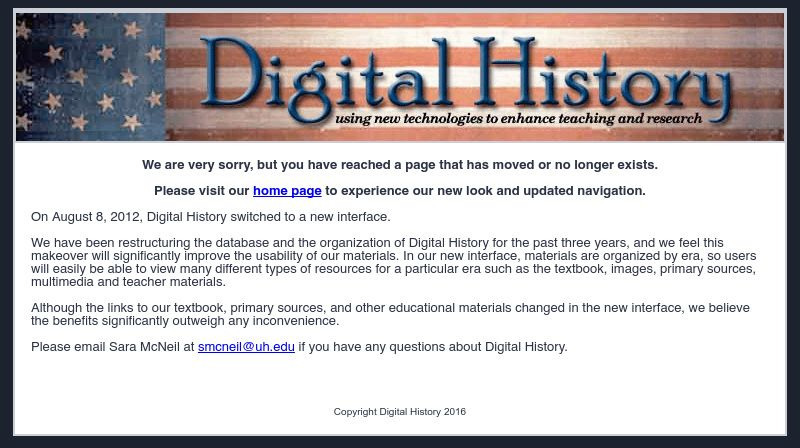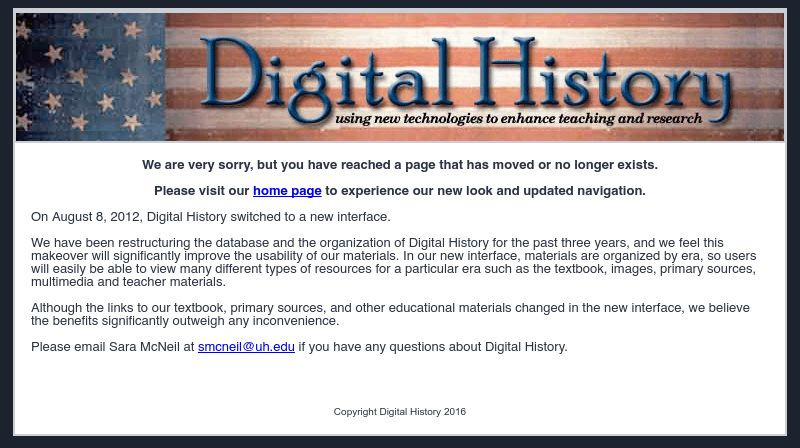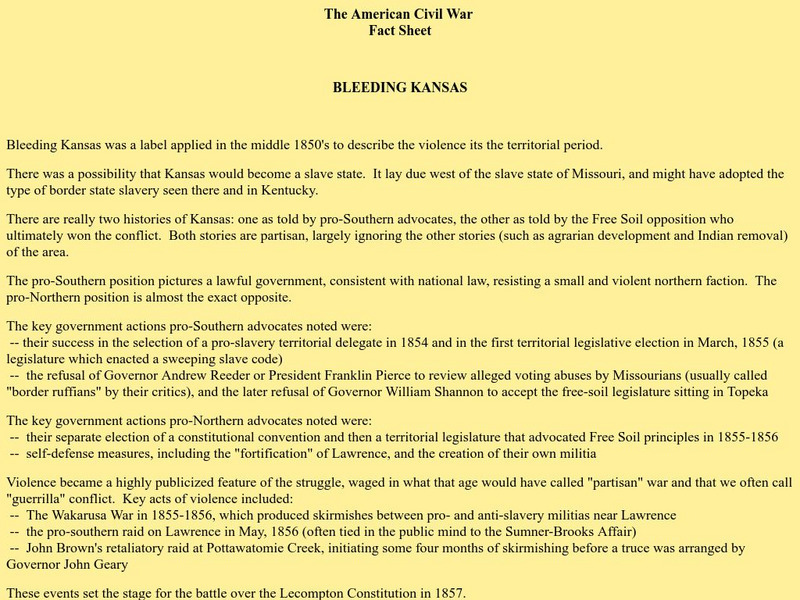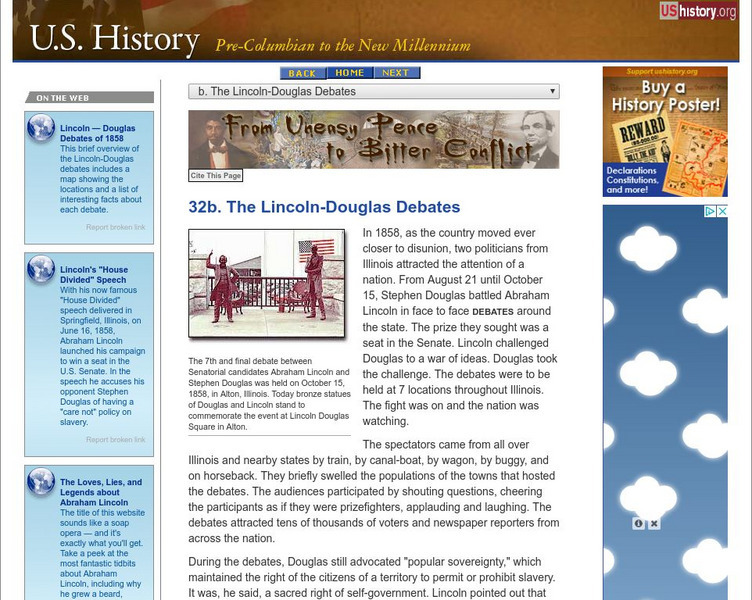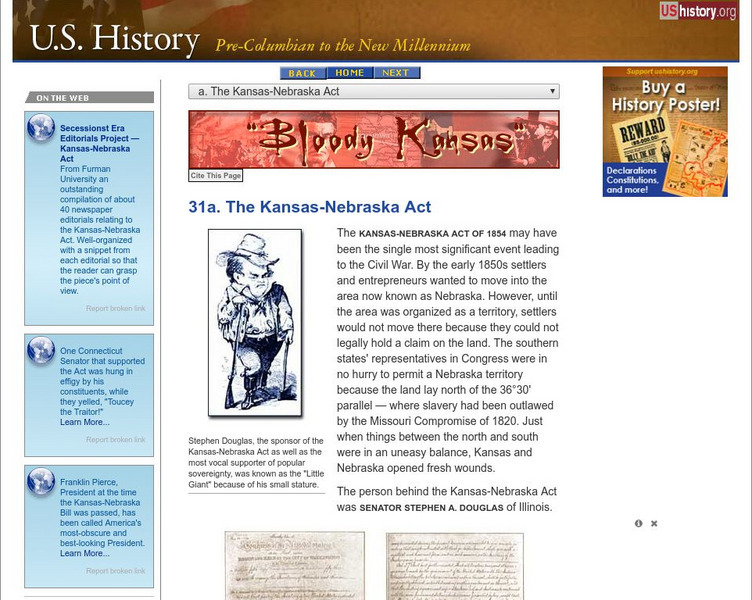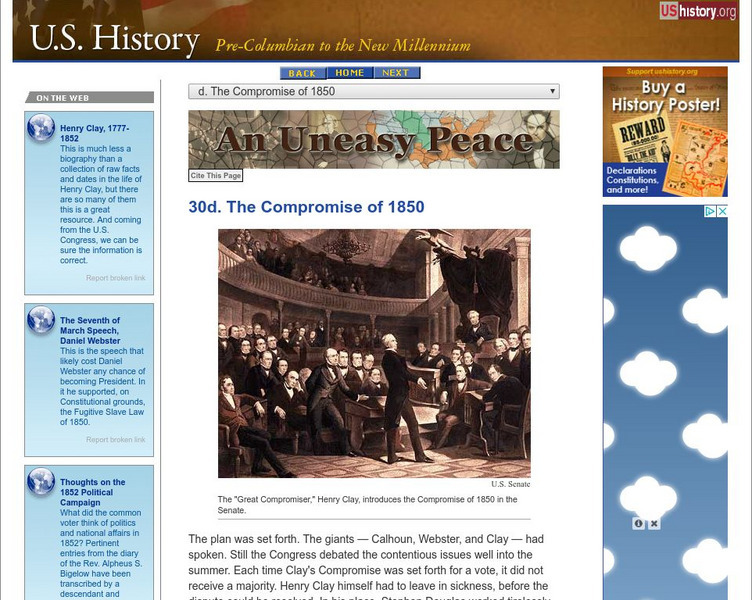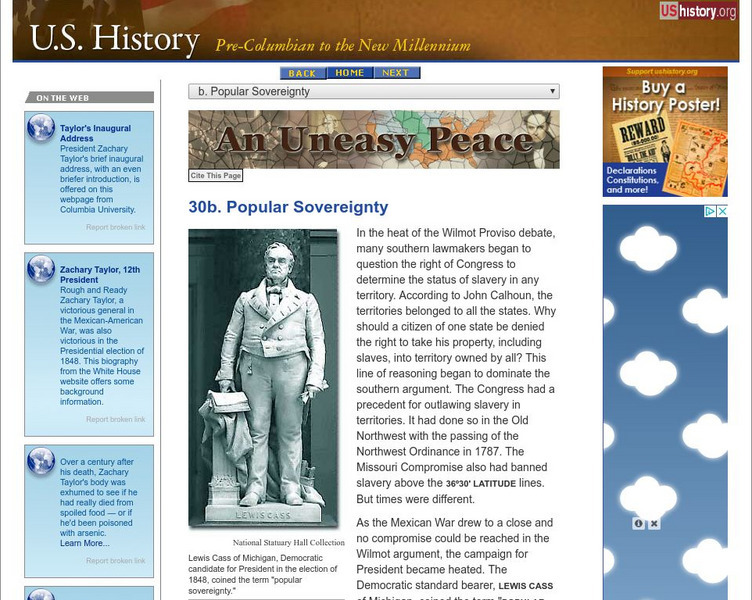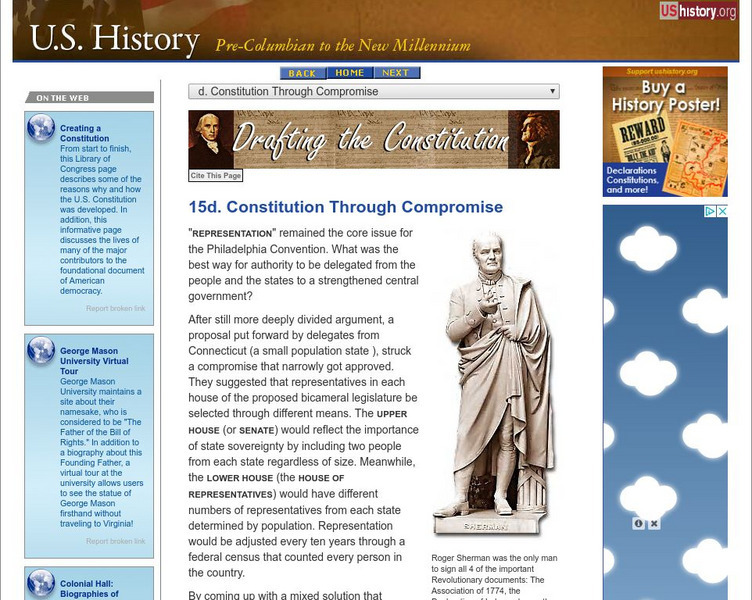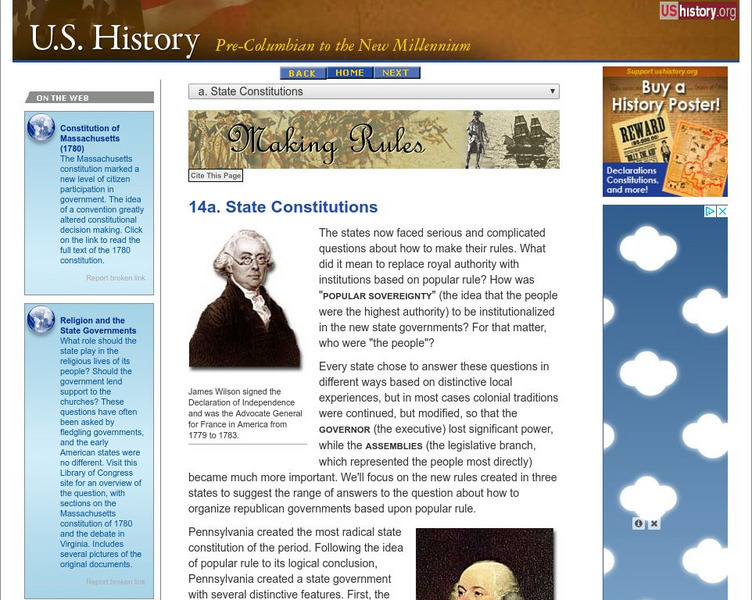Hi, what do you want to do?
University of Groningen
American History: Outlines: A Divided Nation
This page from the American Revolution Project of the University of Groningen discusses how the 1850s were a time of conflicting ideas between North and South regarding the expansion of slavery. Scroll down to the third paragraph and...
Digital History
Digital History: The Crisis of 1850 [Pdf]
Read excerpts of the contentious debate about slavery in the territories as the U.S. Congress tried to hammer out legislation that could be passed by both houses and signed into law by the president. Find the provisions of the Compromise...
Digital History
Digital History: Civil War in Kansas [Pdf]
The Compromise of 1850 did not solve all the slavery issues in the territories, which was not surprising. Read about the Kansas-Nebraska Act, put forth by Sen. Stephan Douglas, who proposed that the issue be decided by popular...
Digital History
Digital History: Lincoln vs. Douglas [Pdf]
The Licoln-Douglas debates pitted two great speakers who were espousing different courses for the country in regard to the issue of slavery. Read a snopsis of their seven debates and see what four major issues they debated. [pdf]
Digital History
Digital History: John Brown at Harper's Ferry [Pdf]
Find out about the influences in John Brown's life that led him to think inciting a slave insurrection would be the way to get rid of slavery. Read about his actions in Kansas, and the raid he planned at Harper's Ferry. [pdf]
Digital History
Digital History: The Civil War Begins [Pdf]
The election of 1860 showed the deep divisions that split the country. With four candidates representing four very different approaches to the issue of slavery, the outcome resulted in the secession of South Carolina, followed eventually...
Digital History
Digital History: The Compromise of 1850
Before finding the final terms of the Compromise of 1850, read about the disputes and debate that accompanied the attempts to pass something that would address Northern and Southern concerns.
Digital History
Digital History: The Kansas Nebraska Act
An explanation of how the Kansa-Nebraska Act in effect voided the Missouri Compromise, which had been the law that dictated the territories that could allow slavery. Read about the act proposed by Stephen A. Douglas, and see how a...
Digital History
Digital History: "Bleeding Kansas" and "Bleeding Sumner"
Read about how the concept of popular sovereignty expressed in the Kansas-Nebraska Act resulted in political intrigue and murder in Kansas and the caning of a U.S. Senator in the Senate chamber.
Digital History
Digital History: The Lincoln Douglas Debates
Historic debates, both in substance and form, were held between Abraham Lincoln and Stephen A. Douglas in the Illinois Senate race in 1858. Read about the debates, where tht two men stood on the issue of slavery, and its place in the...
Digital History
Digital History: American Revolution: Introduction
The American Revolution included so much more than just the War for Independence. Read about why it was the first modern revolution and discover the principles that the American revolutionaries were fighting for.
National Endowment for the Humanities
Neh: Edsit Ement: The Growing Crisis of Sectionalism in Antebellum America
In this Curriculum Unit, learners will consider "The Growing Crisis of Sectionalism in Antebellum America: A House Dividing" in 4 Lessons. The unit also includes worksheets and other student materials that can be found under the resource...
PBS
Pbs: American Experience: John Brown's Holy War: Pottawatomie Massacre
PBS provides information on John Brown's involvement in the Pottawatomie Massacre and the reasons behind the massacre.
Wikimedia
Wikipedia: Stephen A. Douglas
he A lengthy biography of Stephen Douglas. Discusses his involvement in politics, in particular, his involvement with the slavery issue, his runs for presidency, his famous debates, and much more.
Other
The American Civil War Fact Sheet: Bleeding Kansas
Fact sheet on Bleeding Kansas with the different views of each side.
Yale University
The Avalon Project: Kansas Nebraska Act 1854
The complete text of the Kansas-Nebraska Act, called an Act to Organize the Territories of Nebraska and Kansas.
University of Chicago
Special Collections Library: Stephen A. Douglas and the American Union
Provides information about the Great Debate between Stephen A. Douglas and Abraham Lincoln.
Independence Hall Association
U.s. History: The Lincoln Douglas Debates
The Lincoln-Douglas debates in 1858 exemplified the rift in the nation concerning the issue of slavery and who should be able to determine whether states were free or slave. Read about this war of ideas that moved from the stage in...
Independence Hall Association
U.s. History: The Kansas Nebraska Act
Read about the essential repeal of the Missouri Compromise, which had established which states could be slave and which would be free for thirty years, with the rancorous passage of the Kansas-Nebraska Act. See who supported it and why,...
Independence Hall Association
U.s. History: The Compromise of 1850
Find the various parts of the Compromise of 1850, proposed by Henry Clay, that extended slavery in some cases, prohibited in others, and added California as a free state. A clear chart shows what parts of the law were beneficial to the...
Independence Hall Association
U.s. History: Popular Sovereignty
Read about the concept of popular sovereignty in relation to issue of expansion of slavery in the territories. It was not as simple as it seemed. Find out about how the issue of slavery was addressed in the election of 1848. Included is...
Independence Hall Association
U.s. History: Constitution Through Compromise
Read about how compromises were reached at the Philadelphia convention that dealt with issues between large and small states, and slave and free states. Take the quick quiz to assess knowledge about the writing of the Constitution.
Independence Hall Association
U.s. History: State Constitutions
The new states did a great deal of experimentation within the bounds of the new republican ideals. Read about three very different takes on how a state should be organized governmentally.
Curated OER
National Park Service: Fort Scott National Historic Site: Bleeding Kansas
Discusses the effects of the Kansas-Nebraska Act. In particular, the site details incidents from the period known as "Bleeding Kansas."






![Digital History: The Crisis of 1850 [Pdf] Website Digital History: The Crisis of 1850 [Pdf] Website](https://static.lp.lexp.cloud/images/attachment_defaults/resource/large/FPO-knovation.png)
